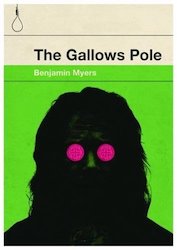
The Gallows Pole is the fourth I’ve read of the six shortlisted titles for this year’s Walter Scott Prize for Historical Fiction. The winner will be announced mid-June, so I still have time to read the remaining two.
The story is set in West Yorkshire in the 18th century. This is Brontë country, the moors, the Upper Calder Valley. As the Industrial Revolution starts to make inroads in Yorkshire, David Hartley and his group of Coiners stage a revolt against the Crown, against the moneymen who want to take the land and build mills, against the inevitable changes coming to their part of England.
Based on a true story, the novel outlines how the Cragg Vale Clippers started a large-scale forgery operation–a crime punishable by death in England then–partly to subvert the country’s economy, but also partly to provide for the starving population in the area. The man who declared himself King David Hartley ran his organization effectively, but brutally, for several years before he was betrayed by an informant looking for a little spiteful revenge and a payday.
This novel is the story of their three-year run. The title itself is a massive spoiler–the destination of King David’s journey.
I am on the fence about this novel. The story is fascinating and in the sections where action takes place and where characters interact, it’s terrific. Best of all is the sporadic inclusion of the secret notes King David writes–in inventive English–while in jail in York Castle, awaiting his sentencing.
What I disliked about the novel is that the author loves lists. He catalogues us to death throughout the book. When King David first assembles the people of the Valley to start the organization, for example, Myers feels compelled to tell us every single one of their names, and where they’re from, even though the names of the vast majority of them are meaningless to us throughout the novel. He does it again in several more places. It’s overkill.
He does a similar thing with his descriptions of the changing seasons and in natural descriptions of the surrounding area. When winter comes along, for instance, he’s not content showing us the barren trees, the coming sleet and snow, the breaths exhaled. Instead we get five pages of over-wrought description. Were this novel a hundred pages shorter, I would have enjoyed it so much more.
I don’t know if it will win the Walter Scott Prize. Certainly none of the three other titles I’ve read so far stands out as a clear choice. So I suspect The Gallows Pole may have a chance. With a little more editorial restraint, it could have been a lock.
The story is set in West Yorkshire in the 18th century. This is Brontë country, the moors, the Upper Calder Valley. As the Industrial Revolution starts to make inroads in Yorkshire, David Hartley and his group of Coiners stage a revolt against the Crown, against the moneymen who want to take the land and build mills, against the inevitable changes coming to their part of England.
Based on a true story, the novel outlines how the Cragg Vale Clippers started a large-scale forgery operation–a crime punishable by death in England then–partly to subvert the country’s economy, but also partly to provide for the starving population in the area. The man who declared himself King David Hartley ran his organization effectively, but brutally, for several years before he was betrayed by an informant looking for a little spiteful revenge and a payday.
This novel is the story of their three-year run. The title itself is a massive spoiler–the destination of King David’s journey.
I am on the fence about this novel. The story is fascinating and in the sections where action takes place and where characters interact, it’s terrific. Best of all is the sporadic inclusion of the secret notes King David writes–in inventive English–while in jail in York Castle, awaiting his sentencing.
What I disliked about the novel is that the author loves lists. He catalogues us to death throughout the book. When King David first assembles the people of the Valley to start the organization, for example, Myers feels compelled to tell us every single one of their names, and where they’re from, even though the names of the vast majority of them are meaningless to us throughout the novel. He does it again in several more places. It’s overkill.
He does a similar thing with his descriptions of the changing seasons and in natural descriptions of the surrounding area. When winter comes along, for instance, he’s not content showing us the barren trees, the coming sleet and snow, the breaths exhaled. Instead we get five pages of over-wrought description. Were this novel a hundred pages shorter, I would have enjoyed it so much more.
I don’t know if it will win the Walter Scott Prize. Certainly none of the three other titles I’ve read so far stands out as a clear choice. So I suspect The Gallows Pole may have a chance. With a little more editorial restraint, it could have been a lock.
 RSS Feed
RSS Feed
